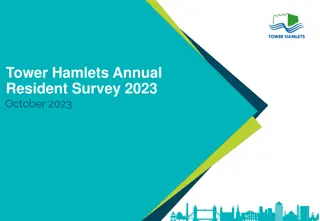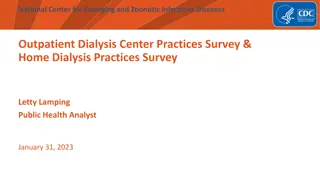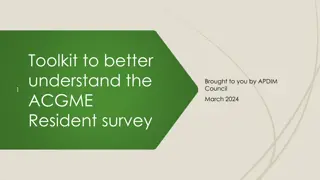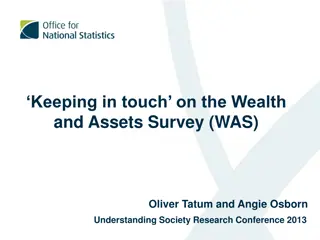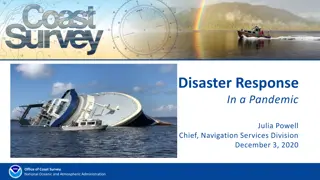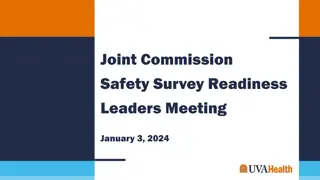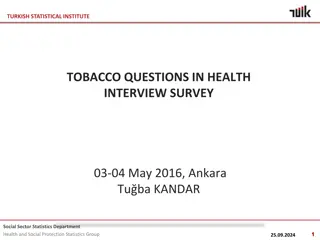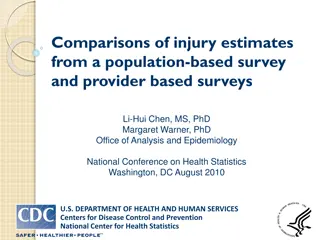
Insights from African Investigative Journalists in a Global Survey
Explore key findings from a survey of African investigative journalists, including gender representation, employment status, challenges faced, and training needs. Discover statistics on registered delegates, speakers, and respondents from various countries, shedding light on the experiences and concerns of journalists in the field. Dive into the realities of personal safety and daily obstacles encountered, offering valuable perspectives on the media landscape in Africa.
Download Presentation

Please find below an Image/Link to download the presentation.
The content on the website is provided AS IS for your information and personal use only. It may not be sold, licensed, or shared on other websites without obtaining consent from the author. If you encounter any issues during the download, it is possible that the publisher has removed the file from their server.
You are allowed to download the files provided on this website for personal or commercial use, subject to the condition that they are used lawfully. All files are the property of their respective owners.
The content on the website is provided AS IS for your information and personal use only. It may not be sold, licensed, or shared on other websites without obtaining consent from the author.
E N D
Presentation Transcript
350 registered delegates 147 speakers 45% women, 54% men, 1% non-binary 40 countries
Mali Mozambique Namibia Tunisia Argentina Congo Burkina Faso Morocco USA Singapore France Spain Belgium Qatar Kenya Zambia Madagascar Thailand Eswatini China Benin Lebanon Malawi Switzerland Sweden Zimbabwe Ghana South Korea Cote d Ivoire Botswana Nigeria Lesotho United Kingdom Uganda Netherlands Tanzania Senegal Comoros Liberia Germany Cameroon Norway South Africa Tanzania
Survey of African investigative journalists Anton Harber. November, 2023
583 responses from 41 countries Respondents self-identify as investigative journalists
Years of experience Average = 8 years
What training do you most need? Data journalism Using artificial intelligence Using social media to investigate Fact-checking Financial investigation
What are the biggest challenges in your daily work? Limited resources/financial constraints Access to information/lack of data/secrecy Security threats Male bosses and colleagues Changing media landscape
Personal safety 24% of our journalists are always worried about their person safety, very worried or feel themselves under serious threat 60% said they had a threat to their personal safety in the last year
Nigeria: I face this almost every day. These include people insulting me on my social media posts, tagging me as enemy of the state etc Sudan: some group from SRF stop me and my friend in check point They pointed the mouths of guns at our heads as soon as they had pictures of the clashes on our phones, despite showing our press cards. Kenya: I was interviewing men then they wanted to rape me at that moment. Sierra Leone: I have faced threats to my life from the police. BBC had to put me in a safe house for three weeks. Ghana: Threats to my life through phone calls and ransacking my house and picking my laptops and other editing tools. Nigeria: While trying to report electoral malpractice and corruption during the 2015 gubernatorial elections I was attacked and beaten and my gadgets confiscated by political hoodlums. I was hospitalised and never got my gadgets in one piece. DRC: Security Service searched my home 2 times. In 2021 I was kicked out of the country but managed to come back, afterwards immigration kept my passport for 7 months Namibia: Once there was a message write on the window of my house: 'I will kill you .
About 40% said they had no SAFETY TRAINING In the last three years
Pay levels 72% of our journalists say they are underpaid, badly underpaid or grossly underpaid
Bribery Have you eve been offered a bribe? Have you ever taken a bribe?

